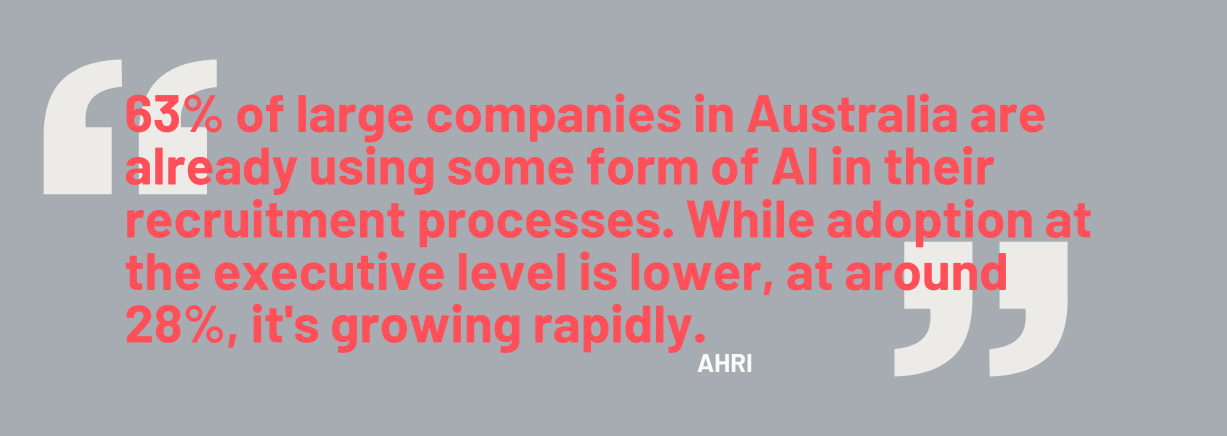The AI Revolution in Executive Recruitment Friend or Foe
As artificial intelligence (AI) continues to reshape industries across the globe, its impact on executive recruitment is becoming increasingly pronounced. In Australia, where the war for top talent is fierce and the business landscape is rapidly evolving, AI is emerging as a powerful tool in the executive search toolkit. But is this technological revolution a boon for the industry, or does it pose risks to the nuanced art of executive placement? Let's delve into the AI revolution in executive recruitment and explore its implications for Australian businesses.

The Current State of AI in Executive Recruitment
According to a 2023 survey by the Australian HR Institute, 63% of large companies in Australia are already using some form of AI in their recruitment processes. While adoption at the executive level is lower, at around 28%, it's growing rapidly. This trend is mirrored in the executive search industry, where firms are increasingly leveraging AI to enhance their services.
How AI is Transforming Executive Recruitment
- Candidate Sourcing: AI algorithms can scan vast databases and online profiles to identify potential candidates who match specific criteria, expanding the talent pool beyond traditional networks.
- Predictive Analytics: AI can analyze historical data to predict a candidate's likelihood of success in a role, considering factors like cultural fit and long-term potential.
- Bias Reduction: Well-designed AI tools can help mitigate unconscious bias in the initial screening process by focusing on skills and experience rather than demographic factors.
- Efficiency Gains: AI can automate time-consuming tasks like initial resume screening and interview scheduling, allowing recruiters to focus on high-value activities.
- Enhanced Candidate Experience: AI-powered chatbots and scheduling tools can provide quick responses to candidate queries and streamline the application process.

The Benefits of AI in Executive Recruitment
- Broader Talent Pool: AI can uncover qualified candidates who might have been overlooked through traditional methods, potentially increasing diversity in executive roles.
- Data-Driven Decisions: AI provides recruiters with data-backed insights to complement their expertise and intuition.
- Faster Time-to-Hire: By automating certain processes, AI can significantly reduce the time it takes to fill executive positions.
- Improved Match Quality: Advanced algorithms can consider a wide range of factors to predict job fit and long-term success.
The Challenges and Risks
Despite its potential, the use of AI in executive recruitment is not without challenges:
- Over-Reliance on Technology: There's a risk of placing too much faith in AI outputs without considering the nuanced aspects of executive roles.
- Data Quality Issues: AI is only as good as the data it's trained on. Biased or incomplete data can lead to flawed recommendations.
- Loss of Human Touch: Executive recruitment often requires a personal touch and deep understanding of organisational dynamics that AI may struggle to replicate.
- Ethical Concerns: The use of AI in recruitment raises questions about data privacy and the ethical implications of using algorithms to make hiring decisions.
- Candidate Skepticism: Some executives may be wary of processes that heavily rely on AI, potentially deterring top talent.
Striking the Right Balance: The Oceans Group Approach
At Oceans Group, we believe the key lies in finding the right balance between technological innovation and human expertise. Here's how we're integrating AI into our executive search process:
- AI-Assisted Sourcing: We use AI to cast a wider net in our initial candidate search, but our experienced consultants make the final decisions on shortlisting.
- Data-Enhanced Insights: AI helps us gather and analyze market data, providing valuable insights to inform our search strategies and client recommendations.
- Bias Check: We employ AI tools to review our processes for potential biases, ensuring a fair and inclusive approach.
- Efficiency Boost: AI handles routine tasks, freeing our team to focus on building relationships and understanding the nuanced needs of our clients and candidates.
- Continuous Learning: We continuously refine our AI models based on placement outcomes and feedback, ensuring our technology evolves with the market.

Best Practices for Leveraging AI in Executive Recruitment
For companies and executive search firms looking to integrate AI into their processes:
- Maintain Human Oversight: Use AI as a tool to support, not replace, human decision-making.
- Ensure Data Quality: Regularly audit and update the data used to train AI systems to ensure accuracy and relevance.
- Prioritize Transparency: Be open with candidates about how AI is used in the recruitment process.
- Customize for Executive Roles: Recognise that executive recruitment often requires a more nuanced approach than lower-level hiring.
- Ongoing Evaluation: Continuously assess the impact of AI on recruitment outcomes and adjust accordingly.
The Future of AI in Executive Recruitment
Looking ahead, we anticipate several trends in the use of AI for executive recruitment:
- Predictive Success Modeling: More sophisticated AI models that can predict long-term executive success based on a wide range of factors.
- AI-Facilitated Assessments: Advanced AI-powered assessment tools that can evaluate leadership potential and cultural fit more accurately.
- Blockchain for Credential Verification: Integration of blockchain technology with AI for secure and efficient verification of executive credentials and experience.
- Augmented Reality Interviews: AI-powered AR interfaces that can simulate workplace scenarios to assess executive performance in lifelike situations.
Conclusion
The AI revolution in executive recruitment is not a question of "if" but "how". When used judiciously, AI has the potential to significantly enhance the executive search process, expanding talent pools, reducing biases, and improving efficiency. However, it's crucial to remember that executive recruitment is as much an art as it is a science.
At Oceans Group, we're embracing AI as a powerful ally in our mission to connect Australian businesses with exceptional executive talent. By combining cutting-edge technology with our deep industry expertise and personal touch, we're positioned to deliver superior results for our clients in this new era of executive recruitment.
The future of executive search lies not in choosing between AI and human expertise, but in harnessing the power of both. Are you ready to embrace this revolution in your executive hiring process?








